Could you brave an 'immersive horror' show?
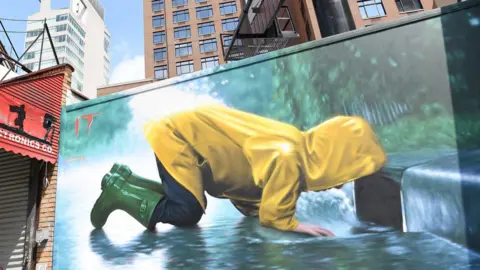 Getty Images
Getty ImagesEarlier this month, horror movie It (based on the Stephen King novel) was released in cinemas. You may well have seen It.
But surely only the bravest among you would've gone to the "immersive" screenings of the movie.
Such fans would've had the pleasure of a real-life Pennywise the Clown creeping round the auditorium during the film, jumping out at them from behind and basically scaring the living daylights out of everyone there.
While many of us may think this sounds like the most utterly hideous experience in the world, not everyone feels that way - immersive horror is becoming quite a thing.
"There's huge growth in this area," says Simon Oakes, CEO of British horror brand Hammer, who have just premiered their first immersive show, The Soulless Ones.
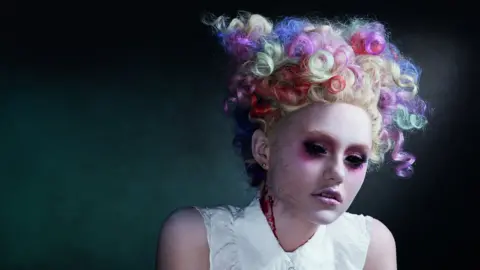 Hammer
Hammer"It's a generational thing, newer audiences want something that's more tangible, emotional, more physical an experience, which is different from the promenade shows that you would've seen before, or even traditional theatre."
As anybody who has been to the cinema in the last decade knows, many people struggle to go for more than about four-and-a-half minutes without checking their WhatsApp, so the appeal of immersive theatre may be down to being totally engrossed in something and disconnected from the outside world.
Of course, we've seen hugely popular immersive shows before with the likes of Punchdrunk and You Me Bum Bum Train.
"There's a whole generation of younger audiences who are excited about the idea of being involved in a story rather than told it," says Oscar Blustin, the co-writer and co-director of The Soulless Ones.
"I think gaming has a lot to do with it, and how young audiences expect things to be interactive.
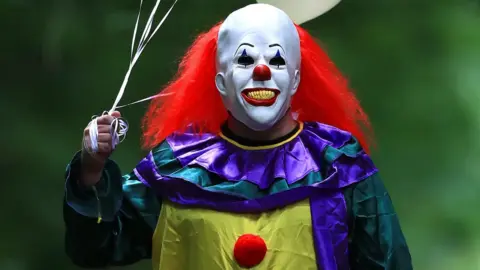 PA
PA"When you watch TV, we've all shouted at the screen, 'Don't go in there!' or 'Don't go upstairs', I think artists are recognising that this can engage audiences more with the narrative."
In the case of The Soulless Ones, Simon says: "We wanted to come up with something completely original."
"With something like The Great Gatsby or Alice in Wonderland, the audience knows what they're going to get. If you know the show, you've already bought into what the creative expectation might be.
"So we chose to start with a completely new show, this isn't a Frankenstein or Dracula, so as a story it's original."
Horror is arguably the genre which provides the most potential to create an immersive experience for theatregoers.
"I think that's because it's able to shed a light on your deepest fears," says Simon.
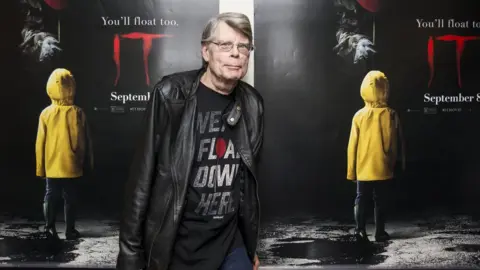 Getty Images
Getty Images"We don't want to frighten people and scare people as much as unsettle them. But it's not a jump-scare performance, which a lot of the modern horror films are.
"The general philosophy behind horror is that if you don't care about the people, you don't care about what happens to them, and with the great genre directors like Kubrick and Hitchcock, you were invested in the characters."
While the immersive screenings of Stephen King's It were just a few special ones organised to promote the film, The Soulless Ones has a residency at Hoxton Hall in London from this week until 31 October.
Oscar explains the show is about "a hive of vampires who are trying to perform a ritual which will let them walk in the daylight - it's our take on the vampire legend".
"That is the over-arching story, but there are 14 characters, and 18-20 different rooms around the building, they all interweave and interlink, it's a patchwork of narrative threads."
That may sound a little overwhelming, but Simon argues one key aspect of the show's appeal is the potential for repeat visits.
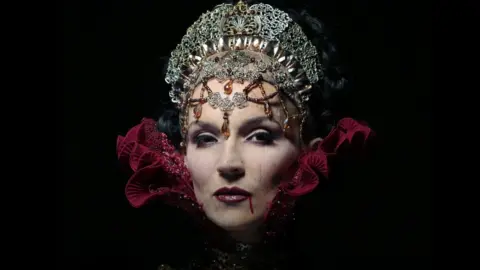 Hammer
Hammer"Because of the number of rooms, we've got 14 hours in total of prepared material," he says.
"And I hope that's one of the reasons people might want to see it again. You'd comfortably be able to see the show four times, and never see the same show twice, if you were clever about the route you take.
"Whichever room you walk into, you'll get a different side of the same story."
Oscar points out that audiences would struggle to play with their phones during performances even if they wanted to, "mostly because the Victorian music hall we're performing in has absolutely no signal".
And if fans enjoy the experience, it could well lead to other similar projects.
"We're not like Marvel or DC comics," says Simon, "at Hammer we feel immersive theatre is an intriguing part of what we do in terms of creating intellectual property.
"But what we do have is a place in this area, if it's successful, to be a building block to others."
Oscar adds: "People are so on the hunt for unique and one-off experiences in particular.
"There's so much to talk about with immersive theatre, audiences who can compare notes on what they've seen and the different experience they've had at the same show.
"In the bar afterwards I'm anticipating a lot of 'What did you see?' conversations."

Follow us on Facebook, on Twitter @BBCNewsEnts, or on Instagram at bbcnewsents. If you have a story suggestion email [email protected].
